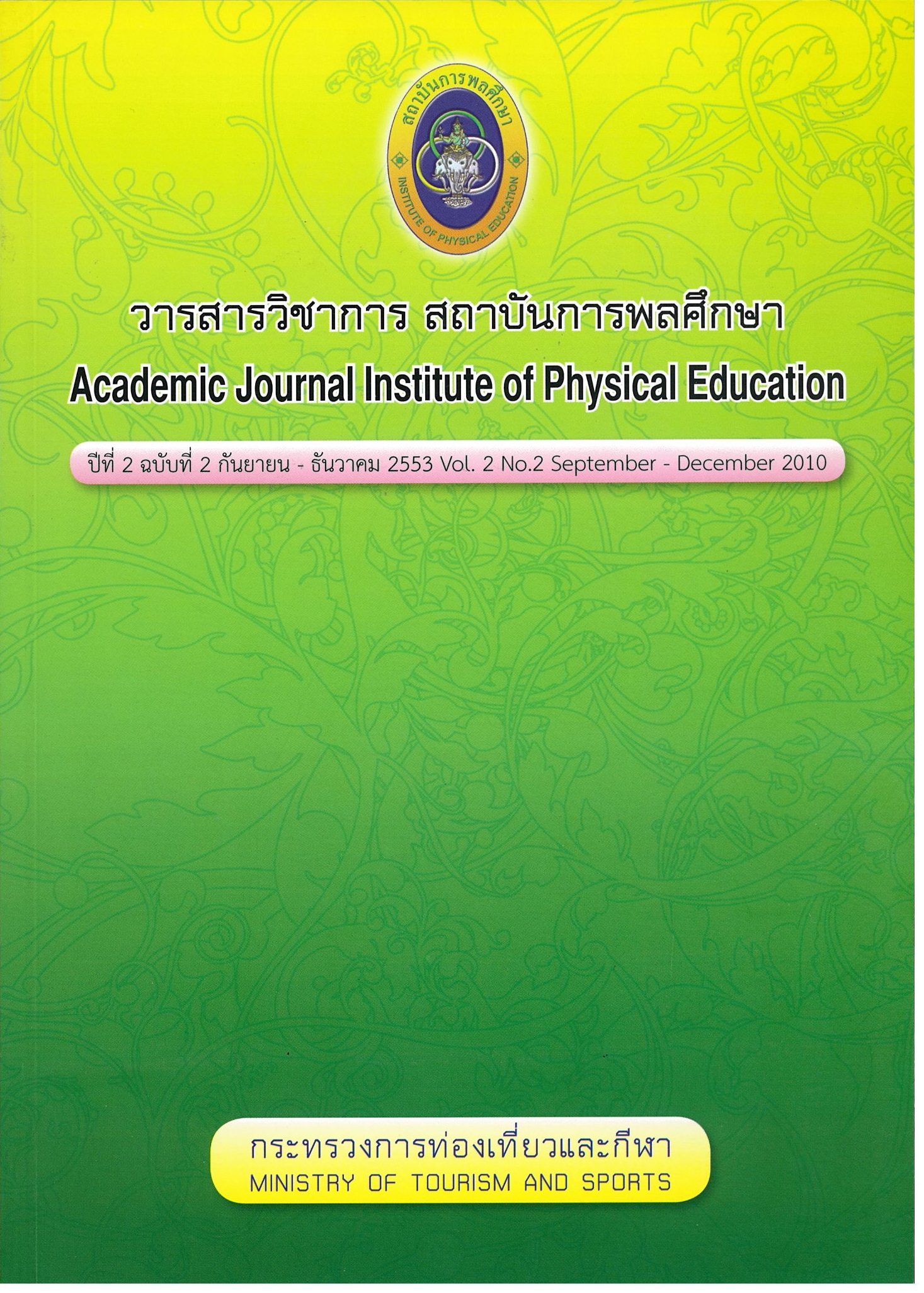TRAINING CURRICULUM DEVELOPMENT ON FUTURE PROBLEM SOLVING FOR STUDENTS OF INSTITUTE OF PHYSICAL EDUCATION, CHAIYAPHUM CAMPUS
Main Article Content
Abstract
The objective of this research was to develop training curriculum in future problem solving for students of Institute of Physical Education, Chaiyaphum Campus. Based on Torrance's concept, the problem solving process comprised with six activities, namely finding problem, determining cause of problem, brain storming for problem solving, criteria development for assessing the problem solving, evaluation for best solution, and development of action plan for problem solving. Being first-year students of Faculty of Education of Institute of Physical Education, Chaiyaphum Campus, the thirty samples were divided into experimental group. The research methodology on curriculum development was as follows:
Step 1: Studying and analyzing the background information to develop training curriculum in future problem solving
Step 2: Developing training curriculum in accordance with future problem solving development by 1) setting up learning framework for future problem solving skill development 2) identifying the content and learning units 3) Determining the learning assessment on future problem solving, and 4) preparing training manuals on future problem solving for further assessment on curriculum appropriateness and consistency done by five experts specialized on curriculum development, measure and evaluation, and researching, respectively. The first revision of training curriculum had been done upon their assessment.
Step 3: Implementing the pilot study to investigate the initial quality of the training
curriculum and assess the curriculum implementation
Step 4: Reviewing the first training curriculum by using the quantitative and qualitative data analyzed from the future problem solving ability scores and the recommendations of the samples
Step 5: Examining the efficiency of training curriculum in future problem solving, comparing the pre-post training future problem solving ability scores, and then doing statistical analysis of such data
Step 6: Reconsidering the revised training curriculum based on the future problem solving ability Scores and the recommendations of the samples for finalized training curriculum
The research findings revealed that
- The future problem solving ability of both experimental had increased in every learning unit at .05 level of statistical significance.
- The post-training future problem solving ability of experimental group was higher than of the control group at the .05 level of statistical significance.
- The overall attitudes of experimental group toward future problem solving training curriculum was high.
- The experimental group had high satisfaction with future problem solving training curriculum in overall.
Article Details
The published article is a copyright of the Academic Journal of Thailand National Sports University. The passage appeared in each article in this academic journal is a perspective of each author which is not related to the journal. Each author is required to be responsible for all components of his/her own article. If there are any mistakes, each author must be responsible for those mistakes on his/her own.
References
วิชาการ, กรม. (2544). รายงานการวิจัย “รูปแบบการจัดการศึกษาสําหรับผู้มีความสามารถพิเศษด้านทักษะ การคิดระดับสูง” กรุงเทพมหานคร: กรมวิชาการ กระทรวงศึกษาธิการ.
โกวิท ประวาลพฤกษ์. (2542). พัฒนาการศึกษาแท้และแฟ้มพัฒนางาน NTQ EMQ ESQ. กรุงเทพมหานคร: เดอะมาสเตอร์กรุ๊ป เมนเนจเม้นท์.
พวงรัตน์ ทวีรัตน์. (2531), วิธีการวิจัยทางพฤติกรรมศาสตร์และสังคมศาสตร์, กรุงเทพมหานคร: โรงพิมพ์เจริญผล.
เพ็ญศรี ทองเพชร และคณะ. (2542). การจัดการเรียนการสอนเน้นผู้เรียนเป็นสําคัญ: 3 กลยุทธ์การจัดการเรียนการสอน, สุราษฎร์ธานี: วิทยาลัยบรมราชชนนีสุราษฏร์ธานี.
วิจิตร จันทรากุล. (2540), “แนวทางการยกระดับคุณภาพการศึกษาไทย : คําตอบอยู่ที่ตําบล” ใน จดหมายข่าวสมาคมครูแห่งประเทศไทย. ฉบับที่ 1 มกราคม.
วิไล ตั้งจิตรสมคิด. (2544). การศึกษาและความเป็นครูไทย. กรุงเทพมหานคร: โอเดียนสโตร์.
สํานักงานคณะกรรมการการศึกษาแห่งชาติ. (2539), จากแผนพัฒนาคนสู่แผนพัฒนาครู. กรุงเทพมหานคร: ไม่ปรากฏสํานักพิมพ์.
อําพล จินดาวัฒนะ. (2542). บันทึก 5 ปีที่ สปช.นนทบุรี : โครงการสวัสดิการวิชาการสถาบันพระบรมราชชนก, กรุงเทพมหานคร: กระทรวงสาธารณสุข.
Torrance Center for Creative Studies. (Online). (2008,8). Available: Georgia Future Problem Solving Program. From http://www.coe.uga.edu/Torrance/problem_solving.html

